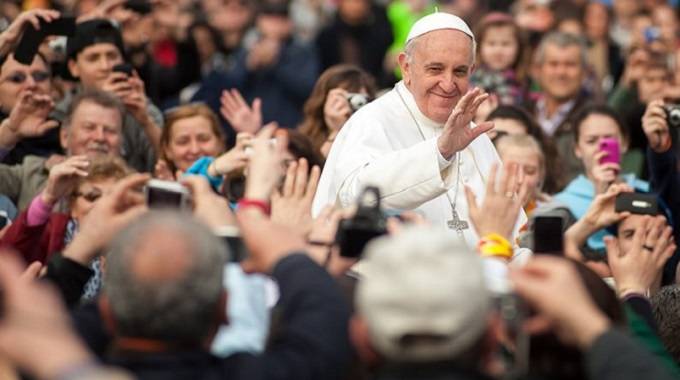Pope calls on journalists to promote world peace

POPE Francis, the world head of the Catholic Church, has called on journalists the world over to promote a ‘journalism of peace’ – a journalism that is truthful and is opposed to falsehoods and sensationalism and a journalism ‘created by people for people and is at the service of all but especially the voiceless’.
In a message to mark World Communications Day, the Pope urged journalists to concentrate less on breaking news but on promoting a deeper understanding between people and contributing to the resolution of conflicts as on offering alternatives to misunderstandings. World Communication Day is observed annually and this year it is being celebrated throughout Zimbabwe on September 30, as Social Communications Sunday. Parishes carry out various and different activities to celebrate the day.
The Zimbabwe Catholic Bishops’ Conference, ZCBC, has set up the Social Communications Commission (SOCCOM) which in turn is responsible for the promotion of the Church’s mission through the media. SOCCOM is also the Church’s instrument for advocacy and public relations and each of the Church’s eight dioceses has a Social Communications Co-ordinator.
Social communications concerns itself with the social doctrine of the Catholic Church and the use of modern means of communications, including the social media, as instruments in the Church’s evangelisation mission and the general attitude of the Church is that all means of communication are very important for society and, thus, also for Catholic social ethics.
In his message, Pope Francis expresses his great concern over the increasing spread of fake news, being the spreading of disinformation online or in the traditional media. “It is false information based on non-existent or distorted data meant to deceive and manipulate the receiver,” the Pope said, adding that spreading fake news served to advance specific goals, influence political decisions and serve selected economic interests.
Pope Francis decries the effectiveness of fake news, effectiveness the pontiff says is due to the ability of fake news to mimic real news and to appear plausible as well as its ability to be believable and ‘captious’. He said, “Fake news grasps people’s attention by appealing to stereotypes and common social prejudices, and exploits instantaneous emotions like anxiety, contempt, anger and frustration.”
The world head of the Catholic Church says that the ability to spread fake news relies on the manipulative use of the social networks and their functionalities, adding that untrue stories spread so quickly even authoritative denials fail to contain the damage caused by the fake news. The Pope said that it was now becoming more and more difficult to unmask and eliminate fake news as most of its audiences interact in homogeneous digital environments that were not easily penetrated by differing perspectives and opinions.
“Disinformation thus thrives on the absence of healthy confrontation with other sources of information that effectively challenge prejudices and generate constructive dialogue,” he said, adding that people instead risked being turned into unwilling accomplices in spreading biased and baseless ideas.
Pope Francis said that the tragedy of disinformation was that it discredited others, presenting such people as enemies to the point of demonising them and fomenting conflict. He said fake news showed intolerance and hypersensitive attitudes that lead to the spread of arrogance and hatred.
The Pope offers suggestions on how to recognise fake news and reminds everyone that it is their duty to counter falsehoods but warned that this was not an easy task as disinformation is often based on ‘deliberately evasive and subtly misleading rhetoric and the use of sophisticated psychological mechanisms’.
He also praised new educational programmes aimed at helping people interpret and assess information provided by the media. Such programmes also sought to educate people on how to unmask falsehoods, rather than unwittingly contributing to the spread of disinformation.
He also lauded institutional and legal initiatives that sought to develop regulations for curbing the spread of false news and these efforts included work by technological and media companies in setting up ways to verify the personal identities of social media users.
Most important, however, the Pope said, was a personal profound and careful process of discernment as this helps in unmasking the ‘snake tactics’ used by communicators who disguised themselves in order to strike at any time and place in ways that seduced and charmed audiences with false and alluring arguments.
Such sly communicators relied mainly on making their falsehoods appear very true or harmless disinformation and a slight distortion of the truth. Pope Francis stresses that there is no such this as harmless disinformation as any falsehood can have dire consequences and even the slightest of distortions could have dangerous effects.
People also needed to stop being greedy, especially for power, enjoyment and ownership. “What is at stake is our greed. Fake news often goes viral, spreading so fast it is hard to stop, not because of the sense of sharing that inspires the social media, but because it appeals to the insatiable greed so easily aroused in human beings” he said. “The economic and manipulative aims that feed disinformation are rooted in a thirst for power, a desire to possess and enjoy, which ultimately makes us victims of something much more tragic: the deceptive power of evil that moves from one lie to another in order to rob us of our interior freedom.”
He called for intensification of education for the truth which taught people on how to discern, evaluate and understand ‘our deepest desires and inclinations, lest we lose sight of what is good and yield to every temptation’.
Pope Francis, making reference to a verse in the Gospel of St John, calls on people to always live by what is true as the truth always sets people free.
“The truth will set you free. (John 8:32). The most radical antidote to the virus of falsehood is purification by the truth,” he said. In Christianity, the Pope said, truth was not just a conceptual reality that regards how people judge things, defining them as true or false, but truth involves the whole life of an individual and it something each and all could lean and count on.
At this stage the Pope calls on people to count on and rely upon only God rather than human beings.
He said that for people to discern the truth, they needed to embrace everything that encourages communion and promotes goodness rather than that which tends to isolate, divide and oppose.
Truth, he advised, should flow from free association between persons, from listening to one another, rather than from being imposed by outside forces.
Truth, he added, is full of respect and did not hurt anyone. “An impeccable argument can indeed rest on undeniable facts, but if it is used to hurt and to discredit another person in the eyes of others, however correct it may appear, it is not truthful.”
Pope Francis said the fruits of truthful statements were the promotion of informed and mature reflections that lead to constructive dialogue and fruitful results while untruthful statements provoked quarrels, fomented division and encouraged resignation.
He said that true news brought about peace throughout the world. He called on people to desist from being greedy and be ready to listen, engage in sincere dialogue and be attracted by goodness as well as take responsibility for their language as the best strategy against falsehoods.
In this respect, he said, a weighty responsibility rested on the shoulders of journalists in their job to provide information. He called journalists ‘protectors of news’ whose occupation was not just a job but a mission during which, while in the frenzied rush for a scoop, they must remember that the heart of the information they reported was the people receiving the news and the impact such news had on these people.
“Informing others means forming others. It means being in touch with people’s lives. That is why ensuring the accuracy of sources and protecting communication are real means of promoting goodness, generating trust and opening the way to communion and peace,” he said.
He concluded his message by inviting scribes to promote a “journalism of peace” that acknowledges the existence of serious problems but is also truthful and opposed to falsehoods, rhetorical slogans and sensational headlines.
“A journalism created by people for people, one that is at the service of all, especially those – and they are in the majority – who have no voice. A journalism less concentrated on breaking news than on exploring the underlying causes of conflicts in order to promote deeper understanding and contribute to their resolution by setting in place virtuous processes.
“A journalism committed to pointing out alternatives to the escalation of shouting matches and verbal violence.” – VaticanNews










Comments